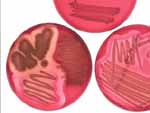
|
|||||||||||||||||||||||||||||||||||||||||||||||||||||||||||||||||||||
|
|
Lecture Hall: Laboratories: Microbiology Bdg1201, 1205, 1206 Required
texts: Available via on-line access:
Prerequisite: BSCI 105 Course Support: We have established an
on-line learning center for this course. We encourage you to
access this center on a regular basis for learning opportunities and
course information. This is also a place to communicate with
your peers, your TA's and your course instructors. The BSCI 223 on-line
learning center can be found in University's closed web system
-Web
CT.
Assignments:
Details for Assignments will be found in the course WebCT space.
Participation/Applied
Knowledge (PAK) Points: Laboratory Midterm and Final will be given in an on-line environment. To complete the exams students will access the exam in WebCT. The exam will take place in CSS Building and will be proctored by teaching assistants. Students are encouraged to prepare for these exams by completing practice quizzes that will be available in WebCT. Students should report to CSS lab at set times.
Course Grade: Your course grade
will be determined based upon the categories listed in the above chart.
The grades will be assigned based upon points earned. See the chart
below:
.
A. Cheating: Intentionally using or attempting to use unauthorized materials, information or study aids in any academic exercise. B. Fabrication: Intentional and unauthorized falsification or invention of any in formation or citation in an academic exercise. C. Facilitating Academic Dishonesty: Intentionally or knowingly helping or attempting to help another to commit an act of academic dishonesty. D. Plagiarism: Intentionally or knowingly representing the words or ideas of another as one's own in any academic exercise. Excused
Absences: Students will not be penalized for absence
due to: Exam Make Up Policy: If a student is aware of a conflict that will prohibit attendance to class on the day of an exam, it is the student's responsibility to contact the instructor as soon as possible to discuss the options for a Make Up exam. If a student misses an exam with an excused absence the option of a Make Up exam is available. On the day of the exam, the student must call or email the course instructor. The student must present a written excuse to the course instructor at the first lecture attended after the absence. At this time the student should also make arrangements for scheduling the makeup exam. It is the student's responsibility to contact the instructor to arrange for a make up exam. Laboratory Attendance: Laboratory attendance is mandatory. Three absences will result in a grade of "F" for the course. In the event of an excused absence, the student should call or email the Teaching Assistant. Upon return to lab, the TA will allow the student to make up missed lab reports. Exam Regrade Policy: Request for re-grading of exams or papers must be submitted in writing to your course instructor within seven days from date when exam/paper was returned. The submission must include your rationale for a re-grade. CORE Applicability : BSCI 223 satisfies the Life Sciences Lab course requirement of the Distributive Studies area of the CORE program. The CORE Program consists of four elements. These elements include: Fundamental Studies, Distributive Studies, Advanced Studies (including the Capstone Course), and a requirement for a course that deals with Human Cultural Diversity. A course taken to satisfy college, major, and/or supporting area requirements may also be used to satisfy CORE Fundamental Studies or Distributive Studies requirements if that course appears on the appropriate list of approved CORE courses. CORE Advanced Studies courses must be selected from areas outside the student's major, with the exception of the Capstone option. Courses taken to satisfy CORE requirements may not be taken on a Pass/Fail basis. |
